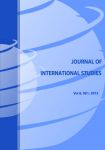FISCAL IMPACT OF THE MIGRATION PHENOMENON
FISCAL IMPACT OF THE MIGRATION PHENOMENON
Author(s): Loredana Andreea Cristea, Janusz GrabaraSubject(s): Migration Studies, EU-Approach / EU-Accession / EU-Development, Fiscal Politics / Budgeting, Asylum, Refugees, Migration as Policy-fields
Published by: Fundacja Centrum Badań Socjologicznych
Keywords: migration; fiscal policy; fiscal revenues; social expenditures; European Union;
Summary/Abstract: The objective of this research has been to summarize the current situation regarding the migration phenomenon evolution and its relation to fiscal revenues and budget expenditures with social benefits, in six European Union member states. The purpose of this paper is to analyze the correlation between taxation and migration in Romania, Poland, Slovenia (emerging economies) and Germany, Italy, Spain (developed economies), as well as to present the proposals on how to optimize the fiscal effects of immigrants and emigrants, so that to ensure a balanced economy. The research methodology involves the use of descriptive, comparative and statistical techniques and through the statistical programs Eviews and SPSS, the data were interpreted using the regression analysis of the panel data. The analysis will be carried out over a longitudinal monthly period of 11 years, namely 1.01.2007-31.12.2017. This period includes the years of economic and financial global crisis, which have also been felt in European Union countries, as well as the years of economic recession. We conclude that the population from emerging countries is a long-term secure labor force for developed countries, while emigrants represent a net fiscal and economic loss for the countries of their origin. Furthermore, taxes and fees are not the main reasons that can influence people in deciding to choose the country where to live and work.
Journal: Journal of International Studies
- Issue Year: 12/2019
- Issue No: 4
- Page Range: 144-159
- Page Count: 16
- Language: English

